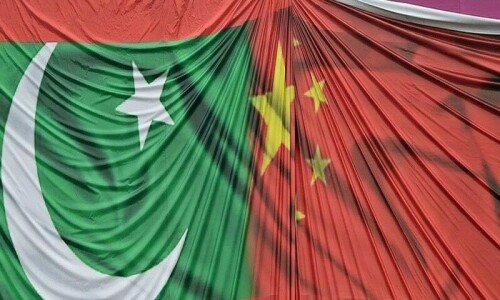
You know you’re interviewing a celebrity CEO when she tells you casually she’s meeting the prime minister for lunch later that day.
As head of a multinational that claims to reach 97 per cent of households nationwide, Unilever Pakistan CEO Shazia Syed has access to a gold mine of consumer spending data. Running the biggest fast-moving consumer goods (FMCG) business means she has her ear to the ground and finger on the pulse unlike the merry band of imported technocrats running the country’s economy.
So what message did she have for Imran Khan as the IMF-prescribed austerity drive curbs consumer demand and slows down economic growth?
Unilever Pakistan CEO Shazia Syed says, ‘Next 18 to 24 months will be challenging. If we get our fundamentals right, I think the situation would improve’
“Our message to the prime minister is that the government should work on confidence-building. The economy needs stimulation. We need some certainty on growth,” Ms Syed told Dawn in a recent interview.
Although she would not say it in so many words, Unilever is in the kind of business that thrived under the old economic order: a consumption-led, import-driven model that ensured low inflation, high growth, cheap credit and artificially low exchange rate without caring two hoots about exports or the balance of payments. The company rolled in money by doubling its business “every few years”.
“We try and aim for double-digit (annual) growth. That’s what we have achieved in the last five years,” she said.
Unilever Pakistan had gross sales of Rs127.3 billion in 2018, up 9pc from a year ago. Its net profit surged 34.4pc to Rs17.7bn for the same period.
The company’s growth rate slid to the single-digit territory last year, Ms Syed said, partly because of the uncertainty in the build-up to the IMF programme. “Consumer is feeling the stress. They’re not in an adventurous mood. Food inflation is in double digits. Utility bills have gone up substantially,” she said.
Tough economic conditions have started changing the shopping patterns. For example, sales of big-pack items have gone down as consumers switch to mid-size and small packs, she says. “Consumers aren’t sure how much cash they’ll be left with in the next week. Austerity is driving household budgets... frills are being cut.”
As a result, she expects a lower annual turnover growth in the next five years than the past five-year average.
Unilever currently sells 30 brands in Pakistan. It’s not going to launch any new product in the foreseeable future as consumers tend to stick to trusted brands in tough economic times, Ms Syed says. “The first step for them is to go to a price point that is affordable for them. So new price points like Rs99 and Rs50 are now emerging across the market,” she says, noting that Unilever is trying to ensure its consumers find new price points within the existing product line-up.
The parent company of Unilever Pakistan considers this market a “billion-euro potential business,” according to Ms Syed. “Had this devaluation not taken place, we would have been very close to the billion-euro mark,” she says.
One of the reasons she cites as proof of the parent company’s “confidence” in this market is that it got Unilever Pakistan delisted from the stock exchange in 2013. The global holding company bought back 3.31 million shares (or 25pc of paid-up shares at the time) from local investors, thus increasing the foreign sponsor’s holding to 99.1pc.
Dismissing the view that the delisting of Unilever Pakistan was a major setback for the country’s capital market, Ms Syed insists that the one-off inflow to consolidate the sponsor’s shareholding was an “unprecedented” move reflecting high potential for growth. Unilever did not delist its local subsidiary in any other part of the world.
Had the company stayed listed on the stock exchange, it’d be the second largest publicly traded FMCG entity today in terms of both total assets and net sales.
Dollar outflows
There is no legal bar on the dollar-based repatriation of dividends and profits on foreign investment. The entire profit of Unilever Pakistan can be remitted to the foreign holding company by way of dividends every year.
This is the reason some economists view multinational companies selling consumer goods unfavourably. For example, 75pc of the raw material that Unilever Pakistan uses to produce its products is imported, the CEO says. The share of exports in its turnover is only about 1-2pc.
This means the company uses foreign exchange to import raw material, produces goods for domestic consumption, converts its rupee earnings into dollars and remits them to the foreign sponsor.
That’s why a lack of import substitution coupled with a liberal foreign exchange transfer regime is one of the contributors to the country’s chronic balance-of-payments crisis.
Downplaying the effect of the import-based consumer business on the macro-economy, Ms Syed says the resultant job creation and economic activity outweigh the downside of dollar repatriation.
“We’ve been the benchmark of quality... Multinationals teach standards and then local players come up to that mark. Then there is level playing field, the dust settles and the market evolves,” she says.
Unilever Pakistan is now gearing up for both import substitution and exports, she says. It is looking to source perfumes, flavours and tomatoes locally. It will not only use these ingredients in locally sold products but also try to grow tomato pulp exports.
The company is also trying to develop cotton seed oil as the local alternative to the imported palm oil, which is used heavily in soaps. “So a disproportionate (amount of) R&D is going into that area.”
Ms Syed says she remains highly optimistic about the potential in the Pakistani economy. “I think next 18 to 24 months will be challenging. If we get our fundamentals right, I think the situation will improve.”
Published in Dawn, The Business and Finance Weekly, July 15th, 2019














































